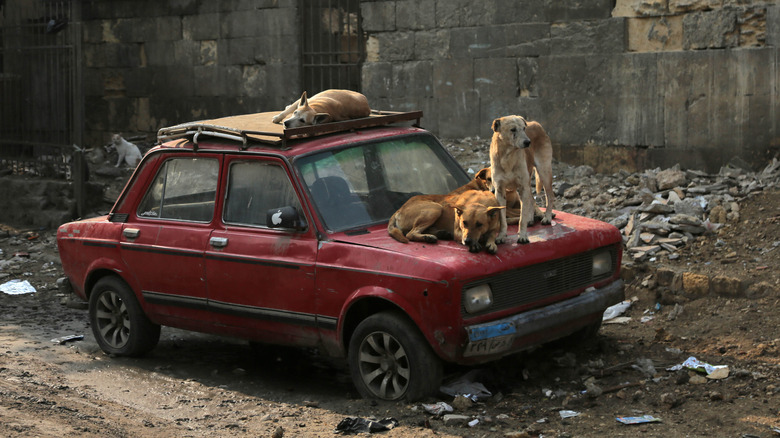The Real Reason There Are So Many Stray Dogs In Egypt
In the land where cats have historically been man's best friend, dogs have been saddled with a rather poor reputation. Strays dogs in Egypt are a huge problem, and they often pose a serious health risk. While strays can be found everywhere around the world the scale of Egypt's wild dog problem is unparalleled. If you've ever lived in or visited Egypt, you will know that each night enormous packs of pups rule the streets, rushing through deserted alleyways in search of food. By day they snooze peacefully on every street corner, keeping out of the baking sun.
According to AP News, the Egyptian government believes there are around 15 million strays on the loose today. That's a lot of mutts who need a home — but historically Egyptians have not been too enthusiastic about taking them in. A notable passage in the Quran, as well as some of the Islamic hadiths, paints a fairly negative picture of mankind's most faithful companion — although there are good reasons to dispute any blanket prohibitions against these animals on religious grounds.
In recent years, Egyptian authorities have opted to solve the problem of stray dogs by poisoning them en masse. But many ordinary Egyptians have found that the sight of dying dogs on every corner turns the stomach. Following a recent outcry, it looks like change is on the horizon for the neglected canines of Egypt.
Islam's view on dogs
According to some interpretations, pet dogs are technically haram in Islam, meaning it is irreligious to keep them. Plenty of people across the MENA region happily ignore this advice, and many Muslim countries have their own indigenous dog breeds. Nonetheless, the stigma is still quite common.
Islam has some surprisingly modern takes on treating animals with kindness — halal butchery for example includes a series of steps thought to minimize an animal's distress and there are also many passages in the Quran that advocate showing kindness towards animals. Yet, the holy book seems to be a little more ambivalent toward canines. In one famous passage, the Angel Gabriel tells the Prophet Muhammad that angels cannot enter houses with dogs in them. This passage alone may be enough to condemn dogs however; in another section, a dog loyally guarding a group of believers who are sheltering in a cave, and working dogs are mentioned as useful companions.
Much more damning are some of the hadiths — the supplementary texts from the Islamic tradition that are used to clarify many parts of the Quran. Readers should note that the validity of individual hadiths is often disputed, and each must be considered separately by Muslim scholars. One respected Hadith, claims that dog saliva is unclean (perhaps a fair assessment), while another goes as far as to say that owning a non-working dog can undermine all a believer's good deeds. A third Hadith, on the other hand, seems to promote canine kindness — recounting a story about a sex worker who is forgiven by God for saving the life of a dog dying of thirst.
Rescuing the unloved pups
Aside from some religious prohibitions against dogs, Egyptian attitudes toward canines have also been shaped by the prevalence of disease. It is unwise to pet a lingering street dog in Egypt due to the high incidence of rabies. According to the World Health Organization, Egypt treats roughly 200,000 people for animal bites each year (of which the majority are from dogs), and around 60 people a year die from rabies infections.
The Egyptian' governments solution to the problem, however — poisoning the dogs — has recently been challenged. In 2020, the Egyptian Independent reported that an attempt to poison dogs in the village of Tunis in Faiyum led to a pushback from locals. When one resident found that his own pet dog had been a victim of the campaign, he began the now-famous "Why Do You Kill Me?" protest on social media, calling for an end to the cruelty.
According to AP News, there has been a surge in pet ownership in Egypt in recent years, as attitudes have begun to change in line with the rest of the world. Egypt's highest religious authority the grand mufti, for example, took a radically pro-dog stance in 2020, denying that the creatures are unclean. Increasingly locals are exploring humane alternatives to killing dogs, such as capturing and neutering them, or vaccinating strays. In some regions teams of volunteers now catch the animals with nets and even put them up for adoption.


